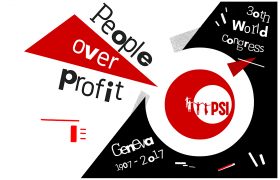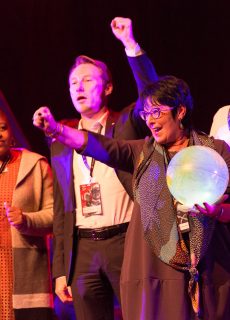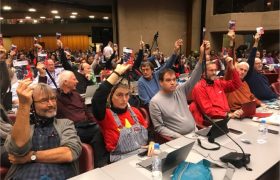
-
Congress photos
-
08:00
Panel 3: More than a Job - The Future of Work in Public Services
- 08:00-09:30 Room 1+2+3+4
Public service workers work for more than money – they also serve their community. To do so, they require labour rights, decent working conditions and involvement in the management of the services they deliver. But this paradigm is changing all over the world.
Economic and technological developments – but also politics and ideology – are contesting the way public services are provided. Many services previously delivered by government employees are now provided by the private or not-for-profit sectors. In some countries, even core government functions – like justice administration and security – are being outsourced. The results are profound changes in employment conditions, de-unionisation, precarious work and shifts in the culture of provision of these services: away from service to community and towards provision for private profit.
At the same time, technological change provides opportunities for powerful interests to re-shape the economy and our thinking about it. Robots, the sharing economy, the platform or app economy, the network society – all change the relationship between labour and capital and are testing long-established concepts such as “employee” and “employer”, “wages”, “leave”, “exploitation”, “privacy”, and – more importantly – “rights”.
To understand and deal with these new forms of labour and public services, we must not forget that technology is owned, controlled and promoted by social actors with specific interests. And that those who promote private models of public services have political, ideological and economic agendas.
Understanding the current trends is essential to protecting public services and workers’ rights.
Facilitated by Nozipho Mbanjwa
author and Journalist for CNBC Africa, each panellist will give their views on what the future of work holds for public service workers.
Panellists:
Rosa Pavanelli
General Secretary, Public Services International
Guy Ryder
Director-General, International Labour Organization (ILO), International
Guy will discuss how the ILO future of work agenda relates to public services workersKaren Gregory
Lecturer, Digital Technology, University of Edinburgh, United Kingdom
Serena Sorrentino
General Secretary, Funzione Pubblica CGIL, Italy
Serena will speak about the successful CGIL campaign for a Charter of Labour Rights in Italy and the campaign against the use of ‘vouchers’ introduced by the government to legalise hourly paid work.Annie Enriquez-Geron
President of Public Services Labor Independent Confederation (PSLINK), PHILIPPINES
Annie will outline the recent success of the PSI co-ordinated campaign to get ILO c151 ratified in the Philippines – the first Asian country to do so – and the lessons from the success.Naoki Murakami
President, National Council of Japanese Firefighters and Ambulance Workers, Japan
Murakami will speak about the fight for the right to organise for the many Japanese fire fighters who risk their lives everyday but are denied their basic trade union rights.Marcelo Di Stefano
Secretary for International Relations, Asociación del Personal de la Universidad de Buenos Aires (APUBA)
George Poe Williams
General Secretary, National Health Workers’ Union of Liberia – NAHWAL, Liberia
George will outline the lessons learned from the recent success of the PSI supported campaign to get NAHWAL recognised in Liberia, in the context of the health workers who had previously risked their life during the Ebola outbreak whilst being denied basic trade union rights and often not being paid. -
9:30
General Session (PoA and affiliate resolutions)
- 9:30-11:15 Room 1+2+3+4
-
11:15
Panel 4: Heaven or Hell: Sustainable urbanisation and public services
- 11:15-12:15 Room 1+2+3+4
The world is currently undergoing the fastest urbanisation in history, as people move from rural areas to cities in search of jobs and a better life. Whether urban expansion creates wealth and opportunities or poverty, disease and misery depends on the choices we make about how we run our cities.
The absorption of new city dwellers can create vibrant communities, thriving with diversity, energy and innovation. Inclusive political systems, quality public services, good planning and decent jobs underpin social and economic success. Without them, cities slip towards polarisation between gentrified oasis and ghettos that dehumanise individuals and their communities.
The difference lies in how well authorities provide public services and whether these communities are enfranchised in the political, social and justice frameworks of their cities.
This requires adequate municipal finance, inclusive governance, progressive taxation, fair policing, a sustainable human-friendly eco-system and universal access to quality education, health, housing, water, sanitation, energy and transport. None of this is possible without dedicated, well-trained and remunerated staff, drawn from the community and treated with dignity at work.
When these services are missing, or left to the private sector, and when public sector workers are not valued or denied their rights at work, everybody pays the price.
Facilitated by Jane Dudman
Editor of the Guardian’s Public Leaders’ Network, each panellist will give their views on the role of public services in achieving sustainable urbanisation.
Jane Dudman will also be speaking on megatrends and challenges in local and regional government.
Panellists
Mark Hancock
National President, Canadian Union of Public Employees – CUPE, Canada
Mark will discuss the issue of bringing urban public services back in-house and funding them sustainably.Mette Nord
President, Fagforbundet (Norwegian Union of Municipal and General Employees), Norway
Mette will discuss building union strength and tripartite social dialogue at a local levelIbrahim Khaleel Abdulkadir
President, Nigeria Union of Local Government Employees – NULGE, Nigeria
Ibrahim will discuss local government autonomy and sustainable funding drawing on the experiences of NULGE’s nation-wide campaign on the issue.Ms Mariko Aoki
Vice President, All Japan Prefectural and Municipal Workers Union – JICHIRO, Japan
Ms Aoki will discuss fighting precarious work in in local government and how stable and good working conditions improve service quality.Edgardo Bilsky
Director of research, United Cities and Local Governments – UCLG, Spain
Edgardo will discuss localizing the development agendas and achieving social inclusion in cities. -
12:15
General Session (PoA and affiliate resolutions)
- 12:15-12:45 Room 1+2+3+4
-
12:45
Lunch break
- 12:45-14:15
-
13:00
PSI Congress Demonstration at Place des Nations
- 13:00-13:45
Make sure to bring banners of your union for this massive rally in support of the workers of the United Nations and the trade union rights of all public service workers.

International civil servants are vital for global governance and indispensable in promoting human rights but they are also exposed to threats and attacks where they are deployed. They often lack basic rights such as access to collective bargaining while facing obstacles in accessing justice.
Recently, the International Civil Service Commission (ICSC) tried to unilaterally slash pay for UN Geneva-based staff by 7.5 per cent. UN staff members also face increasing uncertainty with regards to contractual status, benefits, and job loss related to outsourcing and offshoring. There have been cases of retaliation and arbitrary decisions against staff representatives and union officials, including dismissals. This situation produces poor working conditions and has an adverse impact on the UN’s work.
Today non-staff contractors make up 40 percent of the workforce, half of whom have had contractor status for five years or more. This results in a dual workforce: one with full rights and entitlements and another with no or limited entitlements, working in the same organization. This is not in line with international labour principles nor the values promoted by the United Nations.
We also aim to address the issue of unpaid internships in the majority of UN organisations. A significant concern is that they are actively replacing entry-level jobs, limiting access to those who can somehow afford to work for free, usually with parental support, and therefore exacerbating existing inequalities.
Unpaid interns constitute an increasingly large proportion of the UN’s workforce, with a dramatic 10% increase in intern numbers in the past four years. There is a need to adopt the best existing practices: paying all the UN’s interns a living stipend similar to that provided by the ILO, to ensure diversity and equal access.
PSI solidarizes with international civil servants worldwide, as well as UN consultants, interns, volunteers and all those serving and risking their lives in often dangerous theatres of war, peace-keeping operations, natural disasters, epidemic emergencies and defending the rule of law.
We call on the UN to respect the labour and trade union rights of it workers!
We need a strong and unified United Nations, that values its workers and provides fair and equal treatment!
We need a United Nations that reflects diversity, recognizes the value of labour and pays it interns!
Speakers at the Rally:
Rosa Pavanelli – General Secretary, Public Services International
Catherine Comte-Tiberghien, ILO Staff Union
Jamshid Gaziyev, UN staff unions
Bibi Sherifa Khan – UN NYC staff union
UN Interns – Fair Internship Initiative
ILO and UN Staff Unions are affiliated to PSI. The NYC UN Staff Union is affiliated to PSI affiliate AFT (American Federation of Teachers)
-
14:15
Panel 5: For the many: Public services in a just global economy
- 14:15-15:15 Room 1+2+3+4
A world where workers have dignity, where the planet is protected and where everyone can meet their basic needs and fulfil their potential requires a different economic model from the one we have.
An economy for the people is not possible while the paradigm of the market and competition remain all-pervasive, urging a race to the bottom for wages, taxes, public service provision and environmental standards. The current system is only politically sustainable because those who benefit from it have deliberately established an ideology that insidiously promotes myths that public services are inefficient, unable to innovate and are a burden on the economy and society.
Yet people are still strongly committed to the quality public services they receive. People will fight to defend and extend them when strong viable alternatives are presented. There is public anger towards the wealthy and large corporations for not paying their fair share of taxes. Communities are increasingly mobilizing to stop trade agreements that increase inequality, transfer rights to corporations and undermine public services.
We must return public services to their central role in realising human rights and at the core of the democratic state – to ensure democratic regulation, support sustainable development and provide universally accessible services. We must value public services, and public service workers, for both the economic and social contribution they make. Our ability to make progress for a more just economy depends critically on our ability to present credible alternatives, educate, mobilise public opinion and influence decisions-makers.
Facilitated by Tove Maria Ryding
Policy and Advocacy Manager for Tax Justice and Financing for Development, European Network on Debt and Development (Eurodad), this panel will examine what a people centred economy would look like, what role public services would play and how we can build such a future.
Panellists:
Sanya Reid Smith
Legal Advisor and trade specialist, Third World Network, Malaysia
Sanya will outline the threats the new wave of trade agreements poses to workers, democracy and public services.Ayuba Wabba
President, Nigerian Labour Council, Nigeria
Comrade Ayuba will discuss the effects of debt, structural adjustment and multinational corporate tax avoidance on developing countries and share his experience leading Nigerian trade unions in the fight for tax justice and inclusive development.Dennis Kristensen
President, Confederation of Municipal Employees, Denmark
Denniswill reflect on the future of the Nordic welfare model and the implications for workers in Europe and beyond.Ann Pettifor
Economist, City University and New Economics Foundation, South Africa
Ann Pettifor will discuss the problems of the current model of globalisation, how debt is used as smoke screen to undermine public services and the vital role of public services in creating a strong economy. -
15:15
General Session (PoA and affiliate resolutions)
- 15:15-16:30 Room 1+2+3+4
-
16:30
Panel 6: Public Administration: Public Policy for Sale?
- 16:30-17:30 Room 1+2+3+4
Quality public services and democratic government require independent, ethical policy advice, excellent public administrators and fierce regulatory oversight. Experience and evidence shows that public servants must be free from political interference and that the public service must have a strong culture of independence and commitment to service.
But this is changing. Decades of austerity designed to starve the public sector of sufficient resources, combined with propaganda about the superior efficiency of the private sector, have eroded some of the core pillars of public administration. Increasingly, policy development is outsourced to big consultancy firms which have a financial interest in the outcomes and whose employees revolve between senior public service, government and business. The hollowing out of public administration invites corruption, policy capture by business, and service capture by contractors. Privatisation and outsourcing result in the loss of core skills and democratic oversight. Falling wages and insufficient training and precarious employment exacerbate these trends.
We must demand tenured employment to protect from political interference, vested interest, policy capture and corruption. Staff must be well trained to provide excellent advice and service, with adequate remuneration to attract and retain good staff and avoid the incentives for corruption. We need a diverse workforce that reflects the values and aspirations of the community it serves.
Sufficient resources, strong anti-corruption policies, whistleblower protection and enforced legal protections are needed to ensure that public servants can exercise their right to organise and bargain collectively. Public servants must be able to exercise their employment rights.
Facilitated by Ogmundur Jonasson
former Minister of the Interior of Iceland and former PSI Executive Board member, this panel will look at trends in public administration and what they mean for public services, democracy and public-sector workers.
Panellists
Catherine Comte-Tiberghien
Chairperson, ILO Staff Union
Catherine will discuss the importance of international civil servants being able to exercise trade unions rights if we expect our global policy making institutions to develop quality policy free from political and corporate influence.David J. Cox
President, American Federation of Government Employees – AFGE, USA
David will outline the current attacks on democracy, trade union rights and independent policy making under the Trump administration and the implications for the USA and beyond.Ariel Pringles
Secretary for International Relations, Institutional and Human Rights, Unión de empleados de la Justicia Nacional – UEJN, Argentina
Ariel Pringles will discuss the independence of public sector employees and the need for whistleblower’s protection. -
17:30
General Session (PoA and affiliate resolutions)
- 17:30-18:00 Room 1+2+3+4
-
18:00
SOC session and determinations regarding Emergency Resolutions (if needed; closed session)
- 18:00-19:00 Room 5+6
-
18:00
Visit to the Red Cross Museum (registration required)
- 18:00-20:30
The permanent exhibition of the Red Cross Museum, “The Humanitarian Adventure”, presents three contemporary problems that are of particular concern to PSI and its members and in a wider perspective will affect our common future for decades to come: Defending human dignity, Restoring family links and Reducing natural risks. Guides will provide tours in several languages.
-
18:30
Special Premier Screening of 'One Day' video series (open to all)
- 18:30-20:30
In the lead-up to congress, PSI Communications has visited members and affiliates around the world to create a series of short films that examine the challenges, victories and everyday lives of public service workers.
We will have a close look at the lives of unionists fighting against privatisation, facing torture at the hands of dictators, responding to dramatic disasters and making their communities stronger through their work. These films will be premiered at PSI Congress.
-
20:00
Young Workers Social Event (registration required)
- 20:00-23:00
For participants in the Young Workers’ Seminar


